Iran, US Say Nuclear Talks In Final Stage, While Not Sure About Outcome
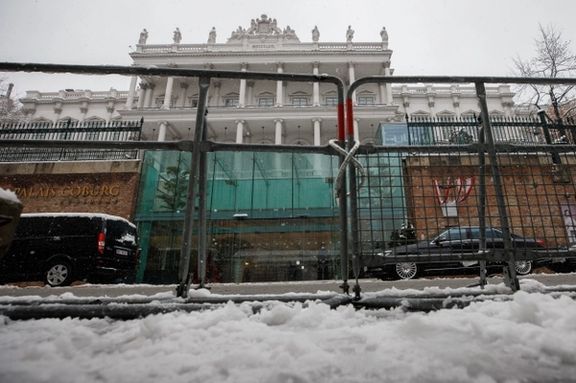
Both the United States and Iran said Wednesday that talks to revive the 2015 nuclear deal are in their final stages, while hedging their bets about the outcome.

Both the United States and Iran said Wednesday that talks to revive the 2015 nuclear deal are in their final stages, while hedging their bets about the outcome.
State Department spokesperson Ned Price said on Wednesday that the US is in "the midst of the very final stages" of indirect talks with Iran.
"This is really the decisive period during which we'll be able to determine whether a mutual return to compliance with the JCPOA is in the offing, or if it's not."
China's chief negotiator in Vienna, Wang Qun, also told Iran International's correspondent that the next day or two can be decisive in the talks, which are in their final satge.
Iran's top nuclear negotiator, Ali Bagheri Kani said on Twitter on Wednesday that "after weeks of intensive talks, we are closer than ever to an agreement; nothing is agreed until everything is agreed, though."
Iran’s foreign minister Hossein Amir-Abdollahian in an interview with the Financial Times said that any guarantee of a lasting agreement by the Biden Administration would not be enough and Tehran wants an assurance from Congress. Iran has been insisting to receive a guarantee that the US will not withdraw from a deal again, as former President Donald Trump decided to abandon the JCPOA in 2018.
Republicans and some Democrats have serious reservations about President Joe Biden’s Iran policy of reviving the JCPOA.
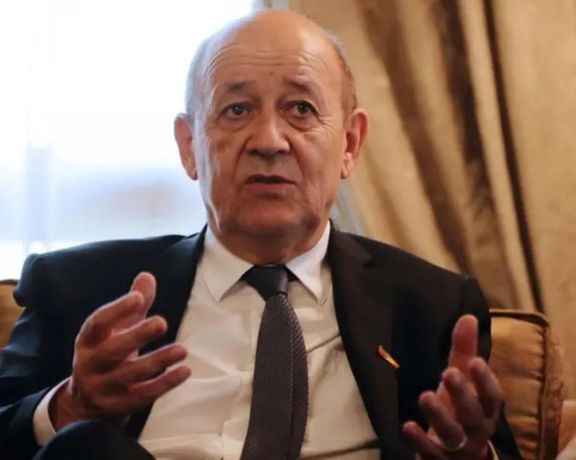
France has warned of a “serious crisis” if agreement is not reached in Vienna within days over reviving the 2015 Iran nuclear deal.
Foreign Minister Jean-Yves Le Drian told the Senate Wednesday that a “tipping point” had been reached. “It's not a matter of weeks, it's a matter of days,” he said. “Political decisions are needed from the Iranians. Either they trigger a serious crisis in the coming days… or they accept an agreement that respects the interests of all the parties.”
Le Drian told the senate that France and other world powers – China, Germany, Russia, the United Kingdom and the United States – were in agreement on the outlines of how to restore the 2015 JCPOA (Joint Comprehensive Plan of Action).
"We are coming to the moment of truth,” he said. “If we want Iran to respect its (nuclear) non-proliferation commitments and in exchange for the United States to lift sanctions, there has to be something left to do it.”
In an interview with the Financial Times published earlier Wednesday, Iran’s Foreign Minister Hossein Amir-Abdollahian suggested the US Congress should issue a “political statement” to reassure Iran it would not again leave the JCPOA, as the US did in 2018.
While the US puts the onus on Iran to reverse steps since 2019 expanding its nuclear program, Iran has argued the US must respect its commitments under the JCPOA, lifting ‘maximum pressure’ sanctions, before it re-joins JCPOA structures.
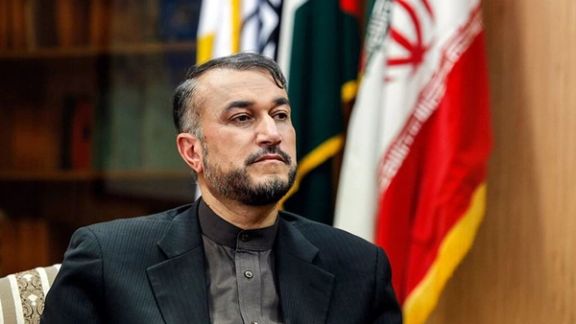
Tehran has proposed that the United States Congress declare support for a revived Iran nuclear deal, Iran’s foreign minister told the Financial Times newspaper.
In an interview published WednesdayHossein Amir-Abdollahian suggested this could meet Iran’s request for guarantees the US would not again renege on the agreement, the JCPOA (Joint Comprehensive Plan of Action).
"At least their parliaments or parliament speakers including the US Congress, can declare in the form of a political statement their commitment to the agreement and return to the JCPOA implementation,” the foreign minister said referring to the US and its three Western allies involved in the talks.
Amir-Adollahian said Iran had received "many messages" from Washington requesting direct talks: “Our last response to Americans and intermediaries was: Any direct dialogue, contact and negotiation with the US would have very huge costs for my government.”
Republicans and some Democrats in Congress are opposed to reviving the JCPOA, arguing that it is insufficient to stop Iran from acquiring nuclear weapons. Only the US Senate has the constitutional right to approve a treaty, and such a statement is hard to imagine coming from the evenly split chamber.
Iran – under both President Ebrahim Raisi and predecessor Hassan Rouhani – has maintained that the US should return to its commitments under the JCPOA, lifting ‘maximum pressure’ sanctions, before it returns to JCPOA structures for discussions.
No surrender
Supreme Leader Ali Khamenei − who backed direct talks with the US over Afghanistan, Iraq, in 2000s and negotiating the JCPOA in 2013-15 − said in a January speech that "negotiations with the enemy at a certain juncture” did not necessitate "surrender.” He had explicitly banned direct talks with the US in November 2018.
There is disagreement in Tehran over whether talking to the US is a pragmatic matter of national interest or a cast-iron principle. The Kayhan newspaper, whose editor Hossain Shariatmadari is a veteran opponent of any nuclear talks, last month criticized both Amir-Abdollahian and Ali Shamkhani,Secretary of the Supreme National Security Council, for floating the possibility.
In a front-page piece January 26 Kayhan detected the "enemy's trick to evade lifting the sanctions” and offered "brotherly advice to the foreign minister and security chief" not to be misled by a mirage.
Saeed Jalili, another JCPOA opponent and like Rouhani a nominee of Khamenei on the SNSC, reportedly earlier this month wrote a 200-page letter to the leader explaining his opposition to continuing talks with world power in Vienna aimed at reviving the JCPOA. In a commentary February 1 the reformist Shargh newspaper claimed Jalili had proposed Iran boosting uranium enrichment to 90 percent– considered ‘weapons grade’ – as a way to achieve the ending of ‘maximum pressure’ sanctions.
People’s interests
While Raisi said during the June presidential election that he would back restoring the JCPOA if it were “in the people’s interests,” some of those who supported him oppose the agreement, which limited Iran’s nuclear program and allowed intrusive United Nations inspections.
On Monday Iran's Foreign Ministry Spokesman said Tehran was awaiting the US President Joe Biden's "political decision" and US “concrete guarantees” over restoring the agreement. Biden, like Raisi, faces domestic opposition, particularly from Republicans who opposed the JCPOA and supported former president Donald Trump’s decision in 2018 to leave it and launch ‘maximum pressure.’
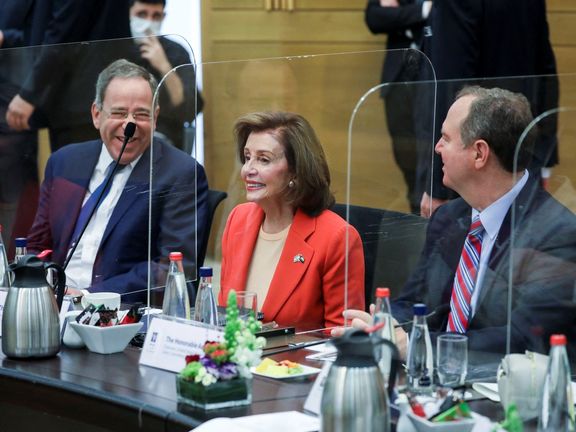
US House of Representatives Speaker Nancy Pelosi says Israel's proximity to Iran is a threat to all of us and the responsibility of all of us.
Pelosi, along with a delegation of Democratic members of Congress arrived in the country on Tuesday as part of her first official visit to Israel in over two years and discussed Iran nuclear talks taking place in Vienna with Knesset members on Wednesday.
"It's a threat to the world. Israel's proximity to Iran is a threat to all of us and the responsibility of all of us", she stressed.
Pelosi -- who once lauded the 2015 nuclear deal as a diplomatic masterpiece – said, "We are together in the fight against terror posed by Iran and its nuclear development”.
Pelosi said relations between the Knesset and Congress were critical, and signed the guestbook of the Knesset's Chagall Hall, writing that the security ties between Israel and the US are stable and strong, and that “our friendship is eternal.”
Knesset Speaker Mickey Levy, who greeted Pelosi, thanked her in particular for congressional approval of funding for the Iron Dome missile defense system, saying, “The passage of the law to fund the replenishment of the Iron Dome system will forever be associated with you... The State of Israel could not have asked for a better friend."
Pelosi said the formation of the State of Israel is the greatest accomplishment of the 20th century, noting that the US is proud to have Israel as an ally and will continue supporting its security and stability.
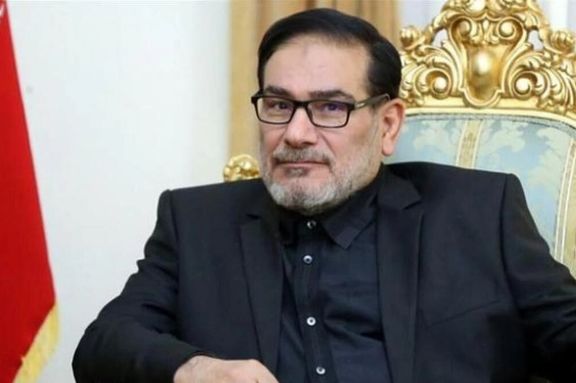
Iran's national security chief says the United States and its European allies have failed to live up to their commitments under the 2015 deal, rendering the JCPOA an empty shell.
Ali Shamkhani wrote in a Persian tweet on Wednesday that the nuclear deal between Iran and the world powers did not bring about any economic benefits for Iran or lift sanctions on the country.
He added that the Islamic Republic will not engage in any negotiations with “oath-breaker America” and “idle Europe.”
As the Iranian negotiating team is engaged in bilateral and multilateral talks with the participants of the Vienna talks, Shamkhani has been sounding negative about the negotiations in recent days and insisting on the removal of all sanctions imposed since 2018 when former US president Donald Trump left the JCPOA.
Shamkhani said last week, “Previous experience has shown that without effective lifting of sanctions, sustainable economic benefits from JCPOA are an illusion.”
The Biden Administration has indicated it is willing to lift nuclear-related sanctions imposed since 2018, but Iran is demanding the removal of other sanctions related to human rights, banking and export violations.
While officials say the eighth round of the Vienna talks is in its concluding stages, another meeting was held Tuesday night between Iranian negotiators, the European Troika, and the representative of the European Union.
Iran’s chief negotiator Ali Bagheri also held a bilateral meeting with the EU coordinator for negotiations Enrique Mora.
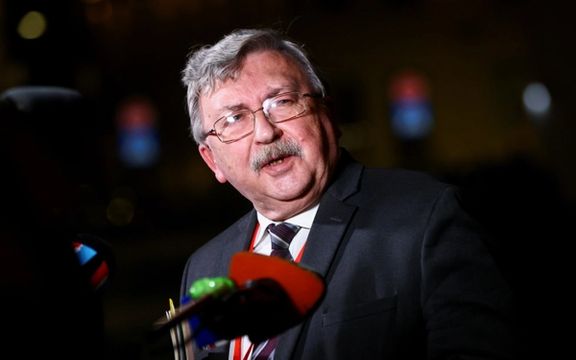
Iranian commentators have been expressing concern about the impact of the Ukraine-Russia crisis on Iran's nuclear negotiations with world powers in Vienna.
Mohsen Jalilvand has said in an interview with Aftab News website that Iran might fall victim to the Ukrainian developments and stressed that the only way to prevent this is holding direct talks with the United States rather than counting on Russia as a mediator between Tehran and Washington. Meanwhile, Jalilvand warned that Russia might take advantage of the situation.
The commentator agreed with Aftab News that a Russian attack on Ukraine seems to be inevitable and such an attack can leave a destructive impact on the Islamic Republic's diplomacy in Vienna. He said that Belarus, China and Iran support Russia in the conflict with Ukraine.
Jalilvand said that a war in Ukraine will lead to the total collapse of the negotiations in Vienna. He added that Russia might also use the Iran card in Vienna adding that "Russia might sell Iran out for concessions."
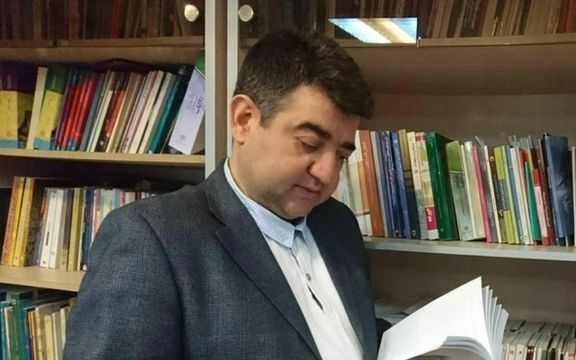
Meanwhile, Foreign Policy Commentator and former diplomat Kourosh Ahmadi said in an interview with Entekhab news website that the United States might soften its position in the Vienna negotiations to have more time to focus on the possibility of a Russian attack on Ukraine.
But he disagreed with Jalilvand on how far a Russian attack can impede talks in Vienna. He said the impact of the Ukrainian crisis on the nuclear negotiations is likely to be minimal and lead to minor disruptions and delays. He added that both the United States and Russia have said before that they have shared interests in the revival of the JCPOA.
Ahmadi reminded that the 2014 occupation of the Crimea took place in the middle of Iran's nuclear negotiations with the P5+1. But the overall impact on the negotiations was minimal. "Whatever Moscow's position, it cannot have a determining impact on the nuclear talks.," Ahmadi said.
Ahmadi said that it is unlikely that the Ukrainian crisis would lead to an all-out classic war. "It is more likely to be a limited operation like what happened in 2014, and not like the occupation of Afghanistan in 1979," he said.
Furthermore, he doubted that Iran would openly support such an attack, reminding that Tehran has not endorsed the 2014 Russian occupation of the Crimea.
He added that "if Iran and America have the political will to come to an agreement, other JCPOA member states can only be facilitators. Otherwise, they will be marginalized. On the other hand, Russia cannot afford not to be part of a possible agreement in Vienna." Ahmadi added that during the past three months Russia has always tried to moderate Iran's positions in Vienna.
In another development, reformist website Zeitoon quoted the former head of the Iranian Parliament's National Security and Foreign Relations committee Heshmatollah Falahatpisheh as saying that the Russians are using Iran as a “barrier” in their confrontation with the West over Ukraine.
Falahatpisheh said: "Based on its interests, Russia is using Iran as a barrier in its confrontation with the United States. Moscow is likely to sell the JCPOA for Ukraine. However, Iranian officials wrongly believe that China and Russia are Iran's strategic allies. This comes while strategic alliance does not mean anything in today's world."